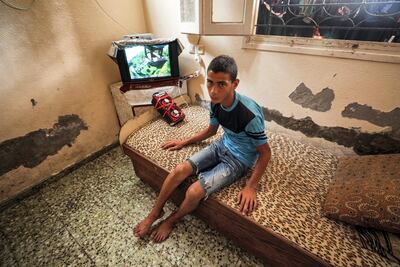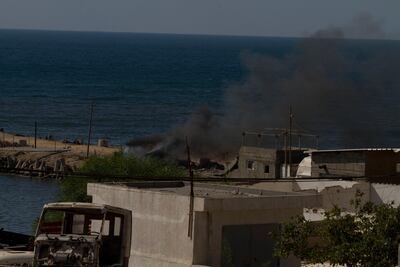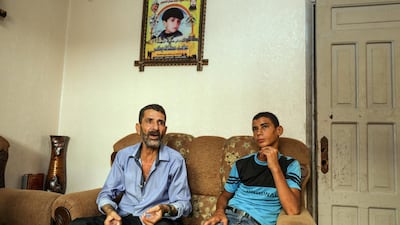Four years after the massacre, Montaser still can’t play the game that brought him and his brothers joy. The sound of a football being kicked revives memories of bombs, shrieks and bloodshed, as well as a scene that he wants to shut out forever.
“I still cannot forget. I was running quickly to flee the area. I survived, but I lost my brother and my cousins,” the 17-year-old recalls of a massacre that occurred just yards from the sparkling waters of the Mediterranean Sea.
Montaser Bakr is the sole remaining survivor of the Bakr children who the Israeli military struck on July 16, 2014, while they played football on a Gaza beach at the height of the enclave’s last war, killing four children aged between nine and 11 years old.
One of them, 10-year-old Zakaria, was his brother. The others, Ismail, Ahed and Mohamed, were all his cousins. They were but four of more than 500 children who died from Israeli military action in the 50-day war.
In mid-2015, Israel closed its investigation into what happened on that day, claiming the area was a “Hamas compound” used by militants. But international journalists present said they witnessed a direct targeting of young children playing near a hut often frequented by fishermen.
Worse for the family, it was initially reported that Israel accidentally shelled the children from ships stationed offshore. Now, the family is seeking justice after new details about the tragedy came to light.
American investigative news site The Intercept has revealed a confidential Israeli military police report that detailed how officers had been tracking the children with armed drones. Two missiles were launched. The first killed one boy, the second, launched without authorisation, killed his three young companions as they tried to flee the scene.
The unauthorised killing in broad daylight by armed drone, remotely controlled and fitted with cameras, raises the prospect that the drone operators knew who they were targeting and possessed more precision than they would have with naval shells.

Sitting on a worn brown couch in the family’s Gaza City home alongside Ahed, his 58-year-old father, and beneath a picture of his dead brother, Montaser recalls the serious wounds he received all over his body. His physical rehabilitation was long, but he has still not recovered from the shock.
“I stopped going to school, I can't go while my brother and cousins are deprived of this right. How can I continue my life?” he asks. “I can't sleep, I keep remembering what happened”.
The anger against Israel and its military is still raw for the family. They still deny Israel’s claims that the killing was an accident.
"Israel doesn't make mistakes, Israel owns the most advanced technology in the world,” says Ahed. “They targeted the children directly, they killed them with three missiles”.
The family is being helped by an array of lawyers from both inside the West Bank and the Gaza Strip. They are advocating for the imprisonment of those responsible for the two deadly drone stirkes.
"When the Israeli officer asked for a clarification, he doesn't wait for the answer and launches the missile to kill the children,” says Samer Zaqout, a lawyer at the Almezan Center for Human Rights. “So this officer committed a violation against international law and he is supposed to be punished to be an example for others”.
_________
Read more:
Fleeing war, Syrians in Gaza find themselves trapped
Blocked by Israel for years, Palestinian post finally arrives
Israel reopens Kerem Shalom crossing, relieving pressure on Gaza fuel supplies
Israel kills Gaza volunteer medic, two others at Friday protest
__________
The family lawyer, Suhad Bishara of Arab rights group Adalah, said she filed an appeal against the military’s closure of the case in June 2015 on the family’s behalf, but they have waited three years for an answer from the Israeli Attorney General. Ms Bishara says the Israeli military investigations are “far from being in any way independent, efficient, or transparent”.
The lack of a conclusion is reducing the chance that those responsible will ever face a criminal conviction. So the Bakr family, which has not received any compensation or apology from Israel, is now setting its sights on a higher, more independent legal entity.

"Israel is supposed to confess its mistake and apologise to the family,” said Ahed.
“Until now, we didn't witness any justice in our case,” he added, “we will sue Israel in the international criminal court”. He issues a public invitation for lawyers around the world to help him with his case.
But, until the law holds Israel responsible, the family’s suffering will continue, as will their search for answers as to why their children were decapitated as they played football and then dashed to seek cover on what would become Gaza’s sand-filled graveyard.
"The boys went to play football at the beach because there are no places near our home to play freely, we live in crowded area,” 57-year-old fisherman Mohammed Bakr says.
He is but another grieving Gazan father who still longs for his son, Ismail. The boy was just 10 years old when he was killed.
"I am going every day to the beach, looking for the remains of my son’s body that was torn apart by the missile. I did not raise my child so an Israeli pilot could kill him in cold blood”.

